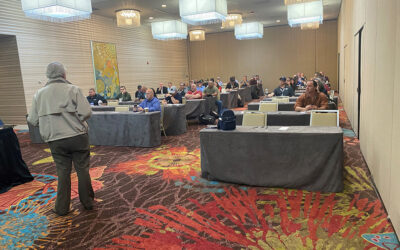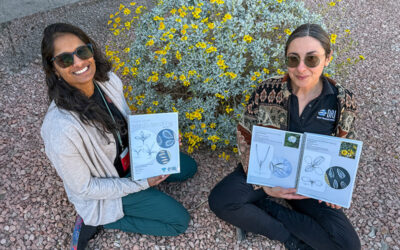Several DRI researchers reported on recent projects at the Nevada Water Resources Association (NWRA) Fall Symposium in Reno this week. They were among engineers, resource managers, water rights professionals, and other stakeholders from across Nevada brought together by NWRA to discuss current water resource management topics, research and technology development, and legal issues related to water in the state.
DRI researchers explored a wide range of topics in their presentations, including drought and fire danger, innovations in irrigation, hydromechanics in mining operations, and more:
- Tim Brown, Ph.D., research professor of climatology and Director of the Western Regional Climate Center, explored the relationship between fuel moisture and fire danger.
- Dan McEvoy, Ph.D., assistant research professor of climatology and regional climatologist at the Western Regional Climate Center, identified a correlation between drought and dire danger indices and is now working with stakeholders to develop prediction strategies for fire based on EDDI (evaporative demand drought index).
- Alan Heyvaert, Ph.D., associate research professor of biochemistry, discussed the impacts of wildfire on surface water, including ash deposition, erosion, and declining water clarity.
- Zhiqiang Fang, Ph.D., postdoctoral researcher in the Division of Hydrologic Sciences, described two recent projects, including evaluating the effects of stresses on tunnels in mining operations using coupled hydromechanical models, and analyzing constant rate fluid injection into rock in geothermal systems.
- Hai Pham, Ph.D., postdoctoral fellow in the Division of Hydrologic Sciences, showed how his team has used groundwater models to examine the effect of groundwater pumping on surface water in the Tahoe Valley South groundwater basin.
- Maureen McCarthy, Ph.D., research faculty in the Division of Earth and Ecosystem Sciences, Christine Albano, graduate research assistant in the Division of Earth and Ecosystem Sciences, and Justin Huntington, Ph.D., research professor of hydrology, presented with colleagues from other institution–including the University of Nevada, Reno and USGS–about the Water for the Seasons project, a program that partners scientists with community water managers and water right holders in the Truckee-Carson River System (TCRS), to explore new strategies and solutions for dealing with extreme climate events such as droughts and floods. The four year study is funded by the National Science Foundation and the U.S. Department of Agriculture, and uses the TCRS in a pilot study to learn how to best link science with decision-making in snow-fed arid-land river systems. By working collaboratively with stakeholders, Water for the Seasons aims to create a model for improving community climate resiliency, or ability to adapt to extreme climatic conditions.
In operation for more than 70 years, NWRA is a non-profit professional association that provides education, networking, and training opportunities for water resources professionals in Nevada. To learn more about NWRA, visit: http://www.nvwra.org/
To learn more about the wide range of water resources research conducted at DRI, please visit: https://www.dri.edu/hydrologic-sciences


